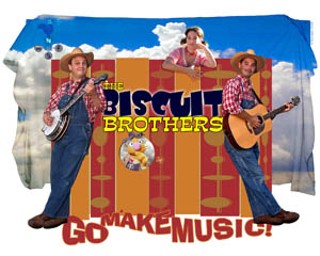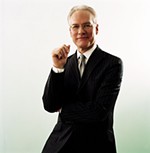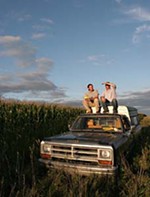Home Grown
Down on Pioneer Farm with KLRU's 'The Biscuit Brothers,' ready for season two but still struggling for funds
By Marrit Ingman, Fri., May 19, 2006

It's a partly cloudy 9:45am, and the blood is draining out of Damon Brown's hand. Planes pass over Pioneer Farm, belying its antique mystique, but neither the traffic from I-35 nor the beep of a reverse horn from the construction of a 1,445-acre master-planned community across the street register on Brown's mic. Before filming can commence, a farmer backs a motor loader into frame.
They are the Biscuit Brothers. Welcome to their show.
Allen Robertson – who you might know as banjo-slinging Buford Biscuit if you have small children – heads off to persuade the farmer to back up his machine. You might know Jill Leberknight as Buttermilk Biscuit, but while her hair is indeed in pigtails, Leberknight isn't wearing gingham and boots; a solid nine-months pregnant, she's camped out by the set's single light, steadying it so it doesn't blow over. Again. The group's fourth, Jerome Schoolar, is only slightly less antic offscreen than he is onstage as Dusty Biscuit, Buford's sidekick. Bouncing on his mark, he asks, "Do I get to chuck a chicken? I've been wantin' to do that."
There will be no chickens thrown today. The star of this scene is Tiny Scarecrow, the dyspeptic puppet hero of the Biscuits' eponymous kids' TV show. Once the disruptions have passed and Brown has shaken out his arm, Tiny is maneuvered back into place, his floppy hat adjusted and his appendages arrayed in a seemly position. Leberknight gives Brown a pad for his other elbow, the one he rests upon underneath a bench while Tiny is on.
When one of Tiny's orange cloth hands drifts toward his puppet crotch, Brown transforms. "Don't cover up my wee-wee!" he shrieks in Tiny's stuffy-nosed twang. "But wait. What's a 'wee-wee'? I don't know that word."
Three men, one woman, one puppet, one camera. Surrounded by sprawl and shot on a shoestring, theirs is a story that could only happen in Austin. People who care about music and performance pick up banjos (and mandolins and tubas and bongos) and put on a show – a good show – with friends and family, bits and pieces of underwriting, donated animation services, and whatever other resources they can scrape together. The guests are local (bluegrass wunderkind Sarah Jarosz, the Texas School for the Deaf choir, and the Kealing Middle School jazz band among them); the locations are local (characters visit Tequila Mockingbird and Collings Guitars); and the in-jokes are entirely Texan. Stay tuned until the outro and you'll hear Willie Nelson.
If you think children's television is too noisy, too violent, too corporate, or too pointless, then you haven't seen The Biscuit Brothers. The premise is simple, but the concepts are complex: rhythm, pitch, melody, and other aspects of basic musical theory; cooperation and teamwork; and creative self-expression and self-esteem. Like the best all-ages entertainments (Brown cites The Muppet Show as an influence), it's also sly and sophisticated, as well as reasonably wholesome. One episode satirizes American Idol with Tiny Scarecrow as Ryan Seacrest; another parodies ER – and the patient is a dented tuba infected with bananas, a feather duster, a set of bagpipes, and a Jim Nabors LP. Parents love the show because it's clever and self-aware and funny, but it's great for kids, too, with weirdly lovable characters and brief, thematically organized segments appealing to multiple intelligences. It's as good as anything you'll find on Noggin or Nick Jr., but with the homegrown appeal of local indie media.
But like so many projects borne of passion, called-in favors, and back-porch puppetry, The Biscuit Brothers is endangered. Though its first season last year on KLRU was a hit with parents and kids, and the show was nominated for a Lone Star Emmy Award, Schoolar, Robertson, and Brown are still struggling. They've embarked on a fundraising juggernaut around town this summer, and they've released their first DVD, Go Make Music: Volume 1 (available from distributor Big Kids) to help finance a second season.
The Biscuits were born in 2000 when Schoolar and Robertson, collaborators from Esther's Follies, were asked to develop a short musical program for a busload of preschoolers visiting Zach Scott on a field trip. Robertson did them one better, putting characters and a story together: Buford and Dusty Biscuit work as field hands at Old McDonald's Musical Farm, where melodies and instruments grow. They goof around, sing traditional tunes like "She'll Be Comin' Around the Mountain" and "Wabash Cannonball," and banter like vaudevillians. The concept was a hit with the kids, and the Biscuits took their schtick to the studio and recorded an album.
Schoolar shopped the album around Los Angeles with the help of a college roommate. "He started showing me around town." Schoolar recalls, "And everywhere I went – I went to Paramount and Arista and Pioneer – they said, 'This is great, but how come you're showing us the merchandise for a TV show?' They all kept saying, 'What you have here is not a band but a brand. Show us your TV show, and the CD can be merchandise for that.' So I came back home to Austin and told Allen, 'Well, we've got to make a TV show.'"
Brown – a "film director extraordinaire" with extensive field experience from Abilene's KTAB-TV – just happened to be Robertson's roommate at the time. Brown says, "Once I got involved in the project, and we kind of did the Garland-Rooney routine – 'Let's make a TV show, even though we have no money and no resources!' – we started to hear about KLRU's initiative for new programming. Before we'd even made the pilot, we spoke with KLRU." But before KLRU could make a decision about the show ("That process took more than a week, and that was too long for us," Brown says), the Biscuits shot the pilot anyway.
Meanwhile, a children's entertainment company expressed an interest in optioning the Biscuits "just to kind of keep it in their stable," according to Brown. "We actually declined a Hollywood offer to go with KLRU and essentially produce the show for free so we could make the show we wanted to make." KLRU signed the Biscuits on for one season and made the show available to PBS affiliates across the United States for no charge, similar to the syndication model adopted by Austin City Limits.
"Once again, being green in the whole process," Schoolar says, "we shot and put the show on the air before we found all the funding for it." Health-care company Scott & White signed on as a partial underwriter, contributing about 15% of the Biscuits' projected production budget for the show's first season. Schoolar adds, "Scott & White is still our sponsor now, up until May and June. And then, once again, we're on an island by ourselves, without any sponsors."
Leberknight, who promotes the show in addition to producing and acting, says, "I think we are fighting two common misconceptions in this process. First, if you are on TV, you must be getting paid. So, on top of spreading the word about the show to local businesses, we have to inform them that we are self-funded. The second misconception is that children's programming is not quality programming and therefore not a viable advertising outlet."
To keep the Biscuits going, Leberknight formed a street team with two fans: Rachel Hobson, who also designed the Biscuits' Web site and e-newsletter, and Carolyn Brown. The group is campaigning for sponsorship from local businesses and managing the Biscuits' Summer Music Series: free concerts at Central Market, branch libraries, and the Austin Children's Museum.
"Kids can print out a passport and bring it to the shows this summer and get stamps at each show they attend. At the end of the summer, they can send it in for a Biscuit prize," Hobson explains. "Very cereal-box fun." She adds semi-facetiously, "Biscuit Street Team is my life."
Likewise, Brown stands firm behind Buford and Dusty. "Once you watch the show, you realize what quality kids' programming should be. It's not pointless nonsense. It's not intellectually insulting, overacted, annoying TV. It's musical education. It's important, and it's fun."
Schoolar says, "We all know that music is being cut in school and that kids aren't getting enough music. Music is the gateway to all learning. Everybody understands that, everybody gets it, but no one is willing to take that next step. That's one of the most frustrating parts. How do we get people to rethink education? They all realize the benefits and value of music, so now let's use that, let's incorporate. They're all saying, 'Yes, go do that,' and then when we get to finding the corporate donors and people like that, they're going, 'Well ... what's the benefit here?' I can show you volume after volume of benefits."
Robertson, the quietest Biscuit, opens up on the topic of music education. "We're doing this because we do want to have an impact. Music had such a huge impact on our three lives. That's why we're doing a show that uses music education to talk about everything, because that's how we process our lives. We use music as a creative outlet, for emotional expression, as a communication tool, to learn about other cultures. It's saved my life, and I want to share that with other people.
"The mission's important enough that however far the word gets out about music education, that's important to us," he adds. "When we've talked about growth, we want to make sure [the show] is small so it still has the heart of three guys trying to make a gift for you, to share something they care about that you can do."
Schoolar agrees. "If we became a big international hit, that's wonderful, and believe me, I would embrace that. If we just become a quality show here in Central Texas, we're going to continue doing that. That's what we do." ![]()
The Biscuit Brothers airs on KLRU, Saturdays at 9am. For more information, see www.biscuitbrothers.com.










